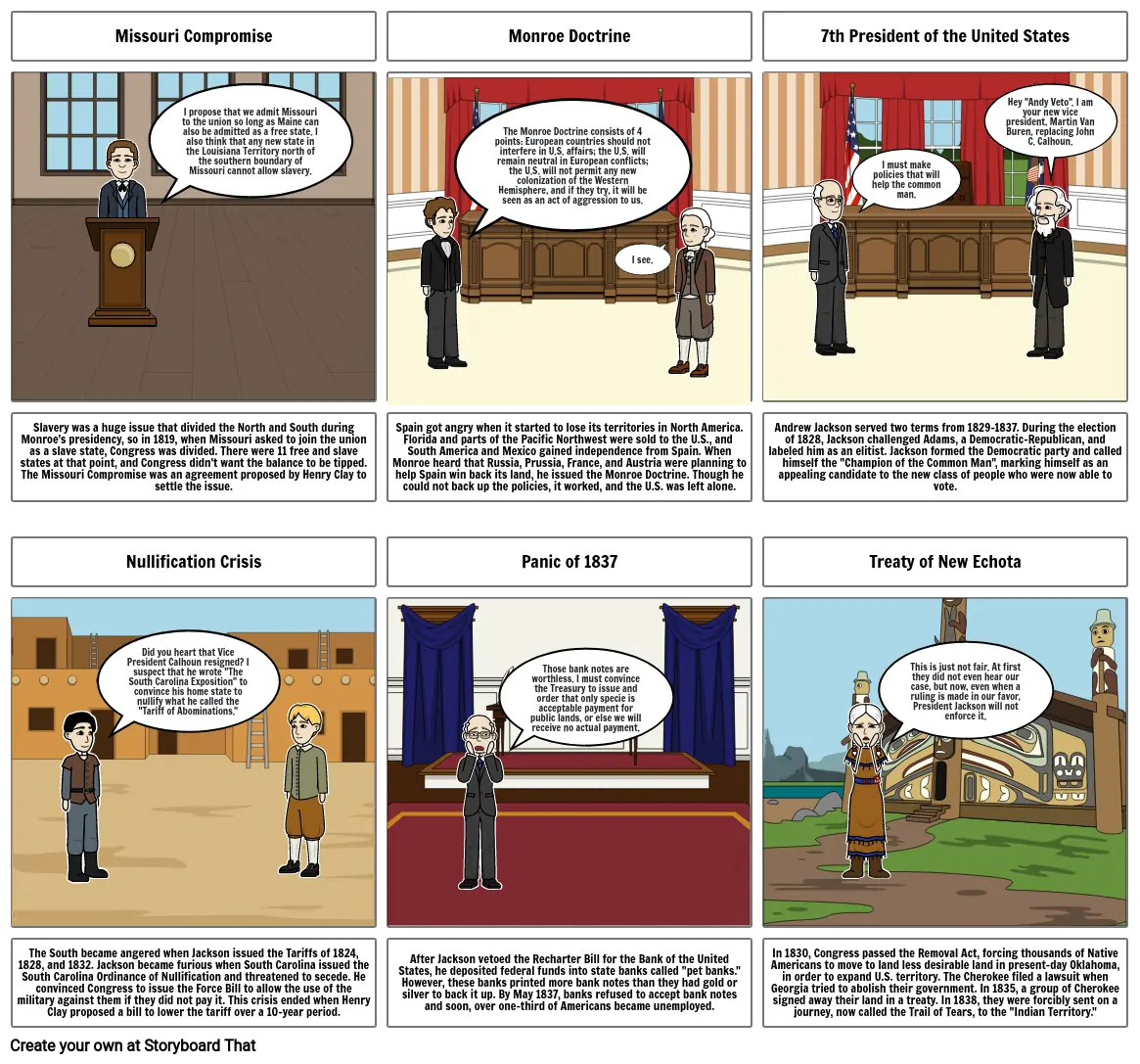Presidencies of James Monroe and Andrew Jackson

Storyboard Text
- Missouri Compromise
- I propose that we admit Missouri to the union so long as Maine can also be admitted as a free state. I also think that any new state in the Louisiana Territory north of the southern boundary of Missouri cannot allow slavery.
- Monroe Doctrine
- The Monroe Doctrine consists of 4 points: European countries should not interfere in U.S. affairs; the U.S. will remain neutral in European conflicts; the U.S. will not permit any new colonization of the Western Hemisphere, and if they try, it will be seen as an act of aggression to us.
- I see.
- 7th President of the United States
- I must make policies that will help the common man.
- Hey "Andy Veto". I am your new vice president, Martin Van Buren, replacing John C. Calhoun.
- Slavery was a huge issue that divided the North and South during Monroe's presidency, so in 1819, when Missouri asked to join the union as a slave state, Congress was divided. There were 11 free and slave states at that point, and Congress didn't want the balance to be tipped. The Missouri Compromise was an agreement proposed by Henry Clay to settle the issue.
- Nullification Crisis
- Did you heart that Vice President Calhoun resigned? I suspect that he wrote "The South Carolina Exposition" to convince his home state to nullify what he called the "Tariff of Abominations."
- Spain got angry when it started to lose its territories in North America. Florida and parts of the Pacific Northwest were sold to the U.S., and South America and Mexico gained independence from Spain. When Monroe heard that Russia, Prussia, France, and Austria were planning to help Spain win back its land, he issued the Monroe Doctrine. Though he could not back up the policies, it worked, and the U.S. was left alone.
- Panic of 1837
- Those bank notes are worthless. I must convince the Treasury to issue and order that only specie is acceptable payment for public lands, or else we will receive no actual payment.
- Andrew Jackson served two terms from 1829-1837. During the election of 1828, Jackson challenged Adams, a Democratic-Republican, and labeled him as an elitist. Jackson formed the Democratic party and called himself the "Champion of the Common Man", marking himself as an appealing candidate to the new class of people who were now able to vote.
- Treaty of New Echota
- This is just not fair. At first they did not even hear our case, but now, even when a ruling is made in our favor, President Jackson will not enforce it.
- The South became angered when Jackson issued the Tariffs of 1824, 1828, and 1832. Jackson became furious when South Carolina issued the South Carolina Ordinance of Nullification and threatened to secede. He convinced Congress to issue the Force Bill to allow the use of the military against them if they did not pay it. This crisis ended when Henry Clay proposed a bill to lower the tariff over a 10-year period.
- After Jackson vetoed the Recharter Bill for the Bank of the United States, he deposited federal funds into state banks called "pet banks." However, these banks printed more bank notes than they had gold or silver to back it up. By May 1837, banks refused to accept bank notes and soon, over one-third of Americans became unemployed.
- In 1830, Congress passed the Removal Act, forcing thousands of Native Americans to move to land less desirable land in present-day Oklahoma, in order to expand U.S. territory. The Cherokee filed a lawsuit when Georgia tried to abolish their government. In 1835, a group of Cherokee signed away their land in a treaty. In 1838, they were forcibly sent on a journey, now called the Trail of Tears, to the "Indian Territory."
Over 30 Million Storyboards Created

